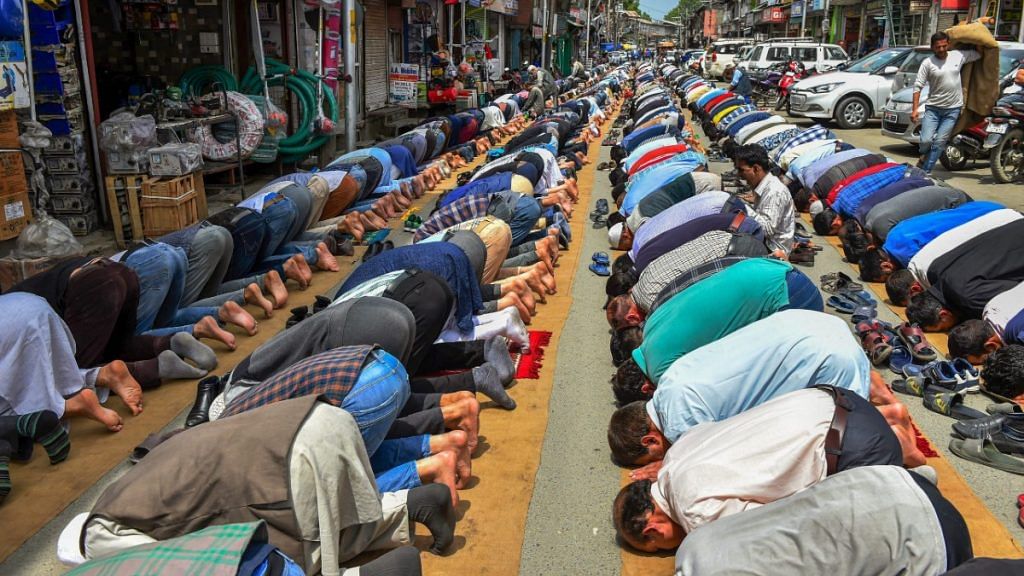New Delhi: With the holy month of Ramadan starting this week, the World Health Organisation (WHO) has issued interim guidelines on safe practices to follow in view of the Covid-19 pandemic.
The Muslim festival — which begins on 24 April and ends 23 May — involves social and religious gatherings where families and friends come together to pray and break their fast. In some countries, it is typically accompanied by night markets selling food, which are visited by locals of all faiths.
“Many Muslims increase their attendance at mosques during the month and congregate for longer prayers for taraweeh a and qiyam. Some Muslims also spend consecutive days and nights at mosques during the last 10 days,” WHO noted in its interim guidelines.
However, this year, giving up on physical distancing measures and following usual social meetings could be harmful as it will facilitate the transmission of Covid-19 — the disease caused by the novel coronavirus which is spread through respiratory droplets during person-to-person contact or due to contact with contaminated surfaces. Its highly infectious nature has seen the disease spread rapidly through the world, infecting more than 2.3 million people and killing around 160,000.
To ensure the global numbers do not leap higher, the WHO has reiterated the need to follow the social distancing, personal hygiene as well as advised governments to clearly communicate the do’s and don’t among general public.
It also suggested that government’s across the globe follow a strong communication strategy to explain the reasons for the decisions taken.
“Clear instructions should be given and the importance of following national policies reinforced. The communication strategy should also include proactive messaging on healthy behaviours during the pandemic and use different media platforms…
“WHO continues to monitor the situation closely for any changes that may affect this interim guidance. Should any factors change, WHO will issue a further update,” the interim guidelines stated.
The interim guidelines expire two years from when it is published.
Also read: Everyone has got it wrong in the Ramadan-Ramzan debate. And no, it’s not about Wahhabism
Avoid big gatherings
Emphasising on the need to follow physical distancing measures, the WHO said these are fundamental mechanisms to control the spread of infectious diseases, particularly respiratory infections associated with large gatherings of people.
“Physical distancing measures, including the closing of mosques, monitoring of public gatherings and other restrictions on movement, will have direct implications for the social and religious gatherings central to Ramadan.”
The guidelines, which are primarily designed by the WHO Regional Office for the Eastern Mediterranean, repeated that there should be a “distance of at least 1 metre (3 feet) between people at all times”.
It also advises avoiding physical contact for cultural and religious greetings and promotes the use of waving, nodding, or placing the hand over the heart.
It also warns people to stop large numbers gathering in places associated with Ramadan activities, such as entertainment venues, markets, and shops.
Also read: ‘Largest viral vector’ — how Tablighi Jamaat spread coronavirus from Malaysia to India
High risk people should limit exposure
In its advice to high-risk groups, the WHO urged people who are feeling unwell or have any symptoms of Covid-19 to avoid attending events and follow the national guidance on follow-up and management of symptomatic cases.
“Shorten the length of the event as much as possible to limit potential exposure. Give preference to holding smaller services with fewer attendees more often, rather than hosting large gatherings,” it said.
It further suggested the older people and anyone with pre-existing medical conditions such as cardiovascular disease, diabetes, chronic respiratory disease, and cancer, to not attend gatherings as they are considered vulnerable to severe disease and death from Covid-19.
In anticipation of finding infected persons, WHO said authorities must consider measures to facilitate contact tracing in the event that an ill person is identified among the attendees of the event.
Also read: What is comorbidity — the factor that likely led to some COVID-19 deaths in India
Doctor’s fasting advice for the ill
There are currently no studies on the risk of fating for a Covid-19 positive patient, but the WHO advised caution nevertheless.
“Healthy people should be able to fast during this Ramadan as in previous years, while COVID-19 patients may consider religious licenses regarding breaking the fast in consultation with their doctors, as they would do with any other disease,” it said.
It further advised against smoking regular cigarettes and water pipes.
“When smoking cigarettes, the fingers (and possibly contaminated cigarettes) touch the lips, which increases the likelihood of the virus entering the respiratory system,” the guidelines warn.
“When water pipes are used, it is likely that mouthpieces and hoses are shared, which also facilitates transmission of the virus,” it added.
Also read: Covid, Ramzan and expats are sparking food shortage fears in Gulf countries
